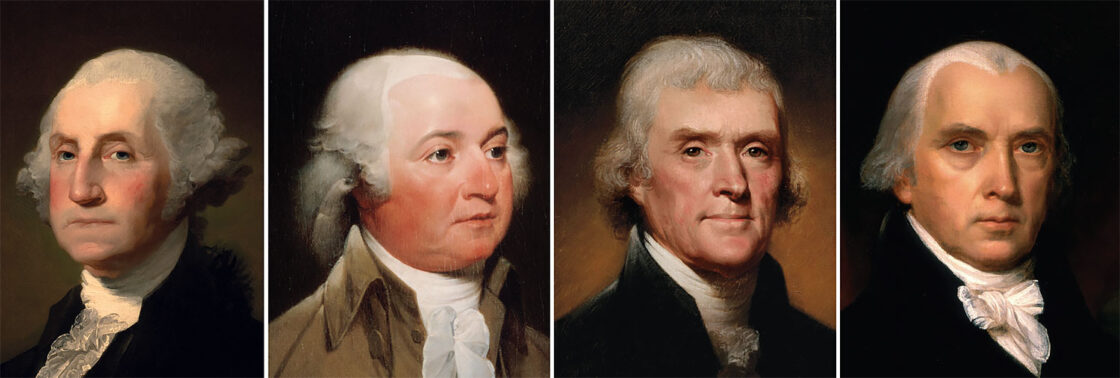Coinciding with Truman’s historic upset over Dewey, Harvard historian Arthur Schlesinger published the first known ranking of U.S. presidents in Life magazine in November 1948. Schlesinger’s methodology was simple: he surveyed an array of historians and political scientists, asking them to rank presidents from “Failure” to “Great.” Schlesinger repeated his survey in 1962.
Twenty years later, the Siena College Research Institute (SCRI) took up the mantle of ranking presidents. The SCRI conducts its survey every second year of the first term of a new president. Other outlets have benefited from the presidential-ranking game as well. C-SPAN has released a poll with every new president since 2000. These types of rankings are also published by the Wall Street Journal, Newsweek, The History News Network, The Times, and the United States Presidency Centre in London. However, the mainstay of the presidential ranking remains the SCRI. As we shall see, there are three significant problems with this methodology: presentism, the evolving role of the presidency, and sui generis.

Left to right: James Monroe, John Quincy Adams, Andrew Jackson, and William Henry Harrison
The Problem of Presentism
Presentism is “the tendency to interpret the past in present terms,”1 and therein lies the first of the three major fallacies of ranking presidential performance. Cultural norms evolve over time, and it is impossible to predict how these cultural norms will change in the future.
In 2001, only 35 percent of Americans supported samesex marriage,2 and George W. Bush was re-elected in 2004 after backing a constitutional amendment banning it.3 His predecessor, Bill Clinton, signed The Defense of Marriage Act in 1996, one of the most discriminatory anti-gay statutes in American history.4 Barack Obama opposed gay marriage when he first ran for president.5 Yet today, 75 percent of Americans support same-sex marriage.6 Times change, and so do attitudes.
Our current social norms recognize the importance of electing an African American to the Executive Office. The day after Barack Obama became the first African American U.S. president, the occasion was so historic, the public clamored for newspapers to save and the November 5, 2008 issue of the New York Times hit $400 on eBay.7 Around the world, Obama’s victory was hailed as nothing short of amazing.8
Will Obama’s historic accomplishment be remembered as such, though? When Americans reflect on the legacy of John F. Kennedy, they note his idealism, his ability to inspire, and his untimely death. What is not often recalled is that JFK was also our first non-Protestant president and anti-Catholic bigotry was still very much in the mainstream when he was nominated.
Our attitudes towards tragedies have changed as well. President Joe Biden’s lowest ranking is “Luck” (he ranks 34th). This most likely reflects the tragedies Biden endured prior to assuming the office; in 1972, then Senator-elect Biden suffered the loss of his first wife and daughter in a car accident, and would lose his son Beau to brain cancer in 2015. While Biden’s losses are indeed tragic, the choice to use this in rating his unluckiness crystallizes the problem of presentism in ranking presidents. In fact, more than half (25 of 46) of our presidents have lost children before, during, or after their time in office. Surely the loss of a child is the most painful experience any parent can have, but Joe Biden is not alone (i.e., “unlucky”) in this respect.
The Evolving Role of The Presidency
In addition to the survey, respondents are asked simple “yes/no” questions including “Is the Presidency growing too big?” Nearly half (44 percent) responded, “yes,” 35 percent responded “no,” and the remaining 21 percent did not respond. The question itself affirms the second major fallacy in “ranking” presidents: the job has changed dramatically since President Washington took office.
Consider the subcategory “Executive Appointments.” Washington appointed a total of four advisors, including Thomas Jefferson (Secretary of State) and Alexander Hamilton (Secretary of The Treasury). There are now 15 executive cabinet positions. Despite this, respondents today are asked to compare and contrast presidents who served in colonial times with those considering tax breaks for Americans who buy solar-powered automobiles.9

Left to right: Abraham Lincoln, Andrew Johnson, Ulysses S. Grant, and Rutherford B. Hayes
Sui Generis
The third fallacy of presidential ranking surveys is the fact that each president faced his own unique challenges. Sui generis is a Latin term that translates to “of its own kind,” and refers to anything that is peculiar to itself: of its own kind or class. And no job is more of its own kind than the U.S. presidency.
Below, I’ve included an analysis of the three broad categories used to construct the SCRI rankings: “attributes,” “abilities,” and “accomplishments,” with select subcategories included to highlight the most obvious limitations.
Attributes
Family
Presidents should neither be given credit nor blamed for their ancestry. With a single exception, all presidents have been White Christian men of relative affluence. Being the son of a president also factors heavily into the Siena College ranking: John Quincy Adams ranks second in this category, and George W. Bush ranks 22 (his highest ranking). Interestingly, George H.W. Bush’s father, Prescott Bush, served as a U.S. Senator, yet Bush Sr. ranks 14 places higher (8) than his son Dubya.
Education
Barack Obama, who graduated magna cum laude from Harvard Law school, ranks 24th in this category. He is ranked just above Grover Cleveland (26), who dropped out of school at age 16 but well below George Washington (7), who dropped out at 11. Woodrow Wilson (8), who earned a PhD in political science from Johns Hopkins University, ranks well above Calvin Coolidge (32), who graduated cum laude from Amherst, but well below John Adams (3), who graduated 15th in a class of 24 at Harvard.
Experience
Until Donald Trump (44), every president was either a military leader, governor, senator, or representative (state or federal). Perhaps our most qualified president was James Buchanan (36), who served five terms in the House of Representatives, a decade in the Senate, and was Secretary of State under Polk and Pierce’s Minister to Great Britain. Historians rightly deem “Old Buck” a failure for thinking the issue of slavery would be readily accepted by the country following the Dred Scott decision of the Supreme Court, which ruled that the U.S. Constitution did not extend American citizenship to people of Black African descent, and thus they could not enjoy the rights and privileges the Constitution conferred upon American citizens. He was followed in office by a man who lost more races than he won: Lincoln (28) was a failed Whig Representative from the Illinois frontier who, during his time in office, abolished slavery and preserved the union.
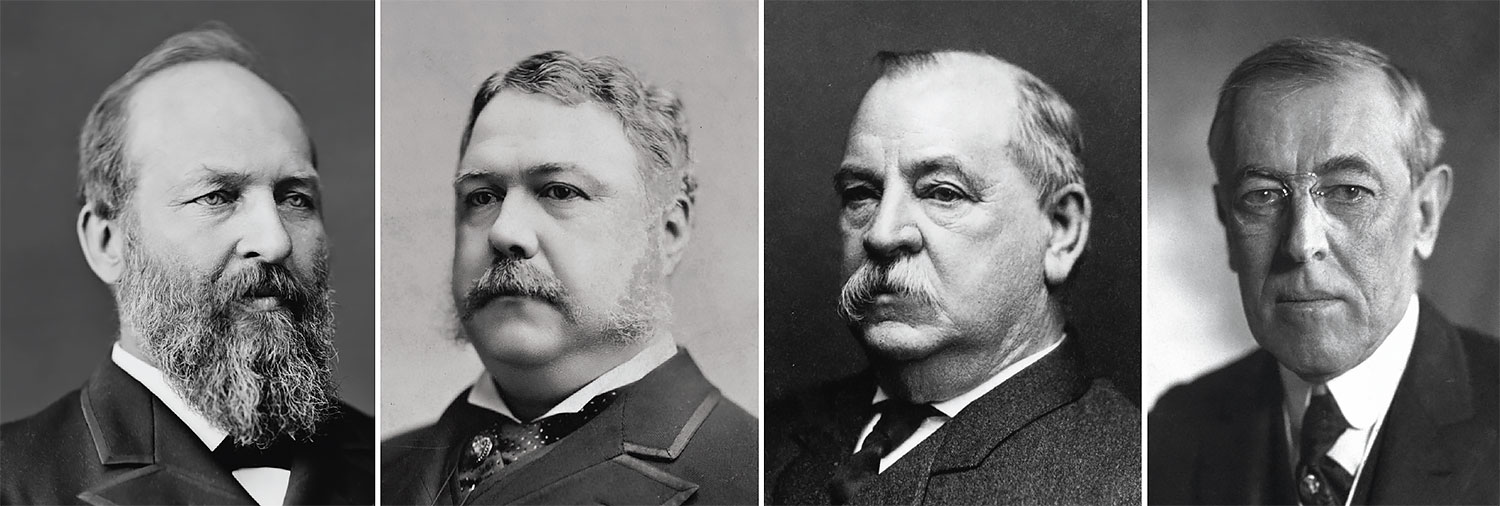
Left to right: James Garfield, Chester A. Arthur, Grover Cleveland, and Woodrow Wilson
Integrity
If nothing else, Grover Cleveland (ranked 26th) was a man of integrity. The only president to serve two non-consecutive terms, he was known for his spotless record. Cleveland paid child support for a son he may have fathered as a bachelor in 1874. When he ran for the Presidency, the Republicans discovered this, and hecklers soon chanted “Ma! Ma! Where’s your pa?” Cleveland’s supporters asked him how he wanted to address the issue. Cleveland simply replied, “Above all, tell the truth.” The sole Gilded Age Democrat in the White House, he vetoed 584 bills, including 238 pocket vetoes (414 first term, 170 second term), more than all other presidents before him, combined. Cleveland’s last words? “I have tried so hard to do right.”
Despite this, historians surveyed at Siena found reasons to rank Ronald Reagan (24) two places higher than Cleveland in the “integrity” category. In contrast to the budget-slashing/reform-minded Cleveland, Reagan’s defense spending increased while entitlements stayed roughly equal. Reagan’s budgets tripled the deficit and grew the national debt from $995 billion to $2.9 trillion, more than was accumulated in the entire prior history of the United States.10 It is $31 trillion today.
Reagan’s Presidency was also marked by numerous scandals. In addition to Iran-Contra, the Reagan years saw HUD rigging, Wedtech, and the EPA Superfund misallocation. And let’s not forget the Savings & Loan crisis. As Martin Mayer rightly described in The Greatest-Ever Bank Robbery: The Collapse of the Savings and Loan Industry, the S&L scandal dwarfed previous scandals like Teapot Dome under Harding (42) and Credit Mobilier under Grant (25). The scandals resulted in the investigation, indictment, or conviction of over 138 administration officials, the largest number for any president in American history up until that time.
Imagination
How does one gauge how imaginative a president was, exactly? Judging from his love of jokes and his speeches, Lincoln (1) was certainly imaginative. He even held a patent, for a flotation device for harboring ships. Musical proficiency may also be indicative of imagination. At least 11 presidents were musicians, Jefferson (2), Truman (5), and Nixon (21) being especially proficient. Nixon appeared on the Jack Paar Show with a classical piece of his own, “Concerto #1.” He also invited Ella Fitzgerald to the White House and backed her up on the piano.
Herbert Hoover, though, ranks 35th in imagination. Most historians now give Hoover credit11 as a good, capable administrator who found himself in the wrong place at the wrong time. In fact, prior to his presidency, Hoover made a name for himself organizing shipments of food for starving millions in Central Europe following World War 1 and then organized massive relief for victims of the Great Mississippi Flood in 1927. After the Crash of 1929, Hoover submitted bills to Congress to create the Reconstruction Finance Corporation to aid businesses and loan federal money to states to feed the unemployed while expanding public works.12 Following his presidency, he spent his days railing against the New Deal,13 meeting Hitler,14 opposing the atomic bomb,15 and serving Truman in further expanding food relief in war-torn Europe. Hoover was equally prodigious as an author, writing books ranging from foreign policy to his own childhood to fly fishing.16 The man was anything but unimaginative.
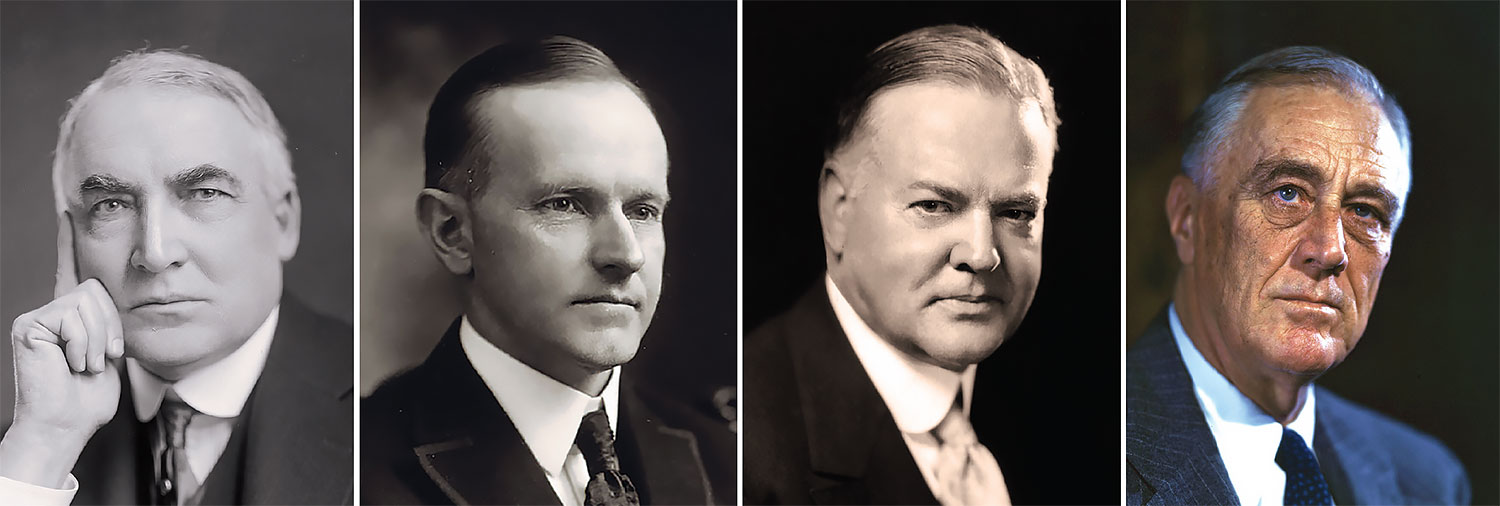
Left to right: Warren G. Harding, Calvin Coolidge, Herbert Hoover, and Franklin D. Roosevelt
Intelligence
No intelligence test has ever been administered to any sitting president, and most died before intelligence tests were invented. However, some studies have been conducted that estimate presidential intelligence with varying findings. The Gough Adjective Check List (1965) has been applied to presidents through the years, as has the Historical Figures Assessment (1977). Simonton (2006) determined “intellectual brilliance” by the statistical technique of factor analyzing 14 distinct descriptors ranging from “curious” and “wise” to “inventive” and “artistic.”17 Predictably, he found Thomas Jefferson’s score (3.1) most “intellectually brilliant,” nearly three times that of his closest runner-up, John Quincy Adams (1.2). The Siena poll ranks John Quincy Adams fifth in intelligence (behind his father [4]), Madison (3), Lincoln (2), and Jefferson (1). James Garfield (20) and Chester Arthur (36) rank near the middle. Both were multilingual, easily conversing in Greek, Latin, and English. Garfield was ambidextrous and able to write simultaneously in both dead languages. He also spoke and campaigned in German. Garfield and Arthur also somehow manage to rank lower than Lyndon Johnson (22), who dropped out of Southwest Texas State Teachers College, now Texas State University, after one year to teach elementary school. (Johnson would return and graduate a year later). Intelligence is among FDR’s (10) lowest categories, though he ranks higher than Garfield and Arthur. This is, perhaps, because “The Boss” was likewise fluent in German, Latin, and French before he entered Groton Preparatory School.18
According to the survey, Donald Trump is the least intelligent president we’ve ever had. The participants’ decision may have been affected by Trump’s refusal to reveal his grades from Fordham and Wharton, the latter from which he earned a B.S. in economics. This ranks Trump less intelligent than Andrew Johnson (42) and Zachary Taylor (32), neither of whom was fully literate until adulthood.
The literature reveals that every sitting president was regularly derided for their lack of intelligence and/ or lack of fitness for the office during their tenure. Biden (27) regularly endures being labeled “stupid” by his detractors,19 and Barack Obama (9) was called a “retard” by Ann Coulter.20 George W. Bush (41) was described as a “numbskull,”21 and his predecessor Bill Clinton (8) was called an “idiot.”22 Even Thomas Jefferson (2), probably the smartest man ever to hold the office, was described by none other than John Adams as “unfit for office (…) a child, a dupe to his party.”23
Interestingly, Warren G. Harding is near the bottom at 43. The child of doctors, he entered college at the age of 14. He also famously went camping with other “unintelligent low achievers” Thomas Edison, Henry Ford, and Harvey Samuel Firestone.24
Willingness to Take Risks
Risk-taking only ranks favorably if the risk taken benefits the country. Polk (7) was willing to risk the lives of American soldiers in the name of Manifest Destiny. The Mexican American War was, as described by then-Lieutenant Ulysses S. Grant (18), “one of the most unjust ever waged by a stronger against a weaker nation. It was an instance of a republic following the bad example of European monarchies, in not considering justice in their desire to acquire additional territory.”25 Regardless of the reasons for the war, The Treaty of Guadalupe Hidalgo garnered 55 percent of Mexican Territory, which now includes parts of Arizona, California, New Mexico, Texas, Colorado, Nevada, and Utah.26
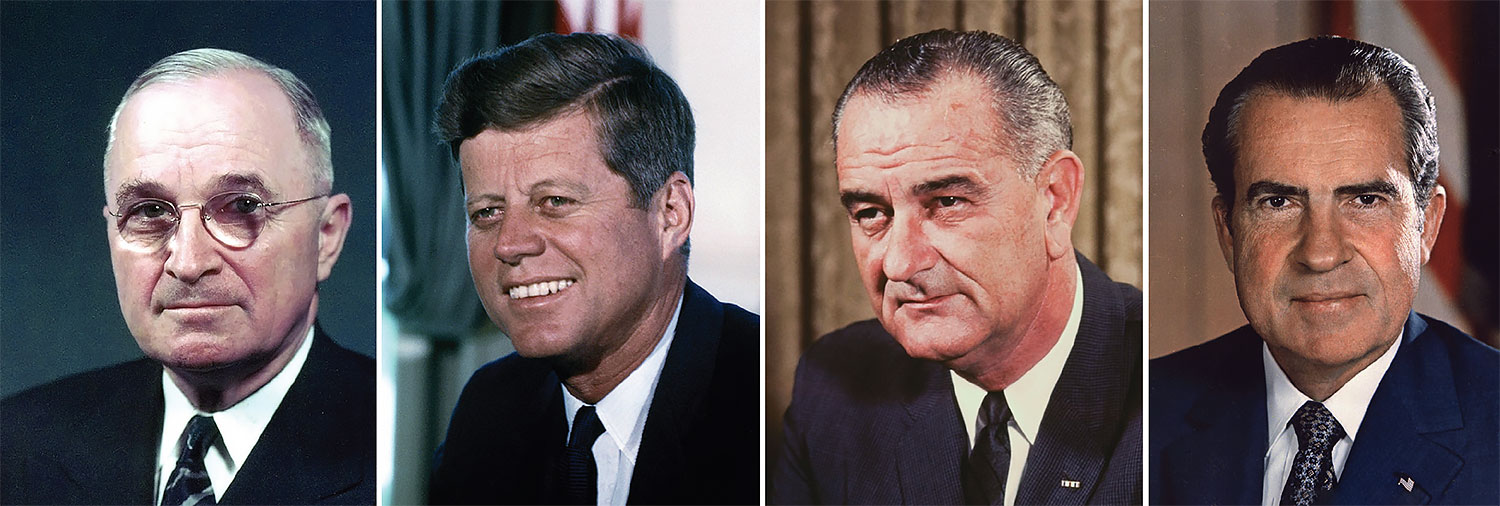
Left to right: Harry S. Truman, John F. Kennedy, Lyndon B. Johnson, and Richard M. Nixon
George W. Bush (20) was willing to take risks, certainly. His preemptive and unnecessary invasion and occupation of Iraq was disastrous.27 Nixon (12) was willing to risk taping himself, including the “Watergate cover-up” conversations that would lead to his resignation.
Abilities
Ability to Compromise
A sitting president’s ability to compromise is worthy of judgment. But here again, context is crucial and every president faces a different challenge. Franklin Roosevelt (4) had an easier task before him in getting Congress to compromise in 1932 and 1936 than presidents without majorities in both Houses.28 His successor, Truman (12), famously battled with the “Do Nothing” Congress, and Bill Clinton (3) governed like a conservative after his party lost seats in both Houses.
If there was ever a president known for compromise though, it would be Rutherford B. Hayes (23). In 1876, Hayes lost the popular vote to Democrat Samuel Tilden. Worse yet, no clear winner emerged because the outcomes in South Carolina, Florida, and Louisiana were unclear, and both parties claimed victory. A compromise was reached in the form of the Electoral Commission Act; the commission decided that Hayes and the Republicans would take the White House, and, in return, federal troops would be removed from the South.29 This “compromise” resulted in the end of Reconstruction and the rise of the Southern Democratic Party (and White Supremacy) until the mid-1960s.30
Communication Ability (Speak, Write)
Donald Trump (43) was the most effective media manipulator the Executive Office ever held. In an era in which millions are regularly spent on political ads, Trump received over $2 billion in free media coverage, more than all of his primary and general election opponent(s) combined.31 His preferred communication channel of social media amassed nearly 150 million followers by the end of his presidency. Yet he has ranked 39 places below Thomas Jefferson, (4) who was such a terrible public speaker that he refused to deliver a State of the Union address to Congress. Instead, Jefferson sent a letter, a tradition that stood until Woodrow Wilson (7) addressed Congress in person in 1913.
Accomplishments
Party Leadership
Jimmy Carter (36) failed to work with his own party, as evidenced by Ted Kennedy’s challenge at the 1980 Democratic Convention.32 Carter is ranked only two spots above Franklin Pierce (38), whose own party ran an “Anyone but Pierce” campaign at his party’s 1852 convention.33
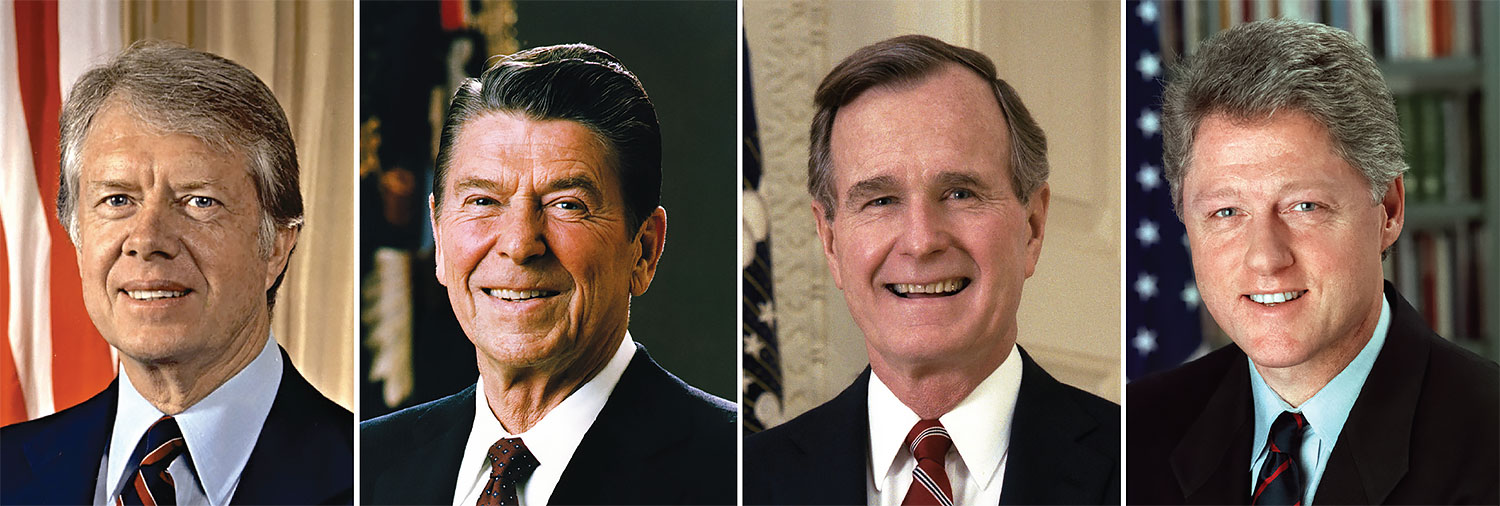
Left to right: Jimmy Carter, Ronald Reagan, George H.W. Bush, and Bill Clint
George Washington (18) was apparently far better at working with his party than either Carter or Pierce. This is perplexing, as The Father of our Country not only didn’t have a political party but warned about them in his final address and died believing they were unnecessary.34
Relationship with Congress
James Monroe (5), enjoyed the “Era of Good Feelings” in 1815, following the U.S.’ loss to Britain in the War of 1812. However, George W. Bush also enjoyed a similar “Era of Good Feelings” following the terrorist attacks of September 11, 2001, when his approval rating hit 92 percent,35 and his Party easily expanded their majority in the midterms. Seven days later, all members of the 107th Congress except Barbara Lee of California voted to authorize President Bush to use military force against those responsible.36 In spite of all this, Bush ranked a distant 22nd.
Court Appointments
Easily the worst and most disastrous Supreme Court decision ever issued was that of Dred Scott v. Sanford (1857). As noted in a previous section, James Buchanan (43) expected that the issue of slavery dividing the country would be settled by the Taney Court’s ruling. It is perplexing then, that the man who appointed Taney to SCOTUS twice (Andrew Jackson) is ranked 30, a full 13 points above Buchanan. Four presidents—William Henry Harrison (42), Zachary Taylor (37), Andrew Johnson (44), and Jimmy Carter (19)—made no SCOTUS appointments at all. Yet only Carter is ranked higher than Jackson.
Domestic Accomplishments
In “Domestic Accomplishments,” Thomas Jefferson (6) is ranked very highly. In 1803, the Senate ratified a treaty with France, promoted by President Jefferson, that doubled the landmass of the new country, eventually encompassing 15 states. It is puzzling, then, that Franklin Pierce is ranked near the bottom in this category (41), even though he signed the Gadsen Purchase in 1851, in which Mexico sold 29,670 square miles of land that eventually became southern Arizona and southwestern New Mexico.37

This article appeared in Skeptic magazine 28.2
Buy print edition
Buy digital edition
Subscribe to print edition
Subscribe to digital edition
Download our app
Foreign Policy Accomplishments
Here Franklin Roosevelt ranks first, followed by Lincoln, and then Washington. Each led as world-altering wars were being fought. Donald Trump ranks 45th in this category, with historians declaring him the worst foreign policy president ever. Trump brokered agreements between Israeli Prime Minister Benjamin Netanyahu, Bahrain, and the United Arab Emirates, and also withdrew from The Trans-Pacific Partnership, bombed Syria twice, and left the Paris Climate Agreement. All these decisions pale in comparison to ignoring secession, a sin committed by the three presidents who preceded Lincoln. One could argue that the Civil War shouldn’t fall under “foreign policy accomplishments.” If this is the case, then, why rank Lincoln so highly?

Left to right: George W. Bush, Barack Obama, Donald J. Trump, and Joe Biden
Avoid Crucial Mistakes
Easily the most crucial mistake a president can make is committing troops to an unnecessary war. Such a mistake is made even worse when the war is lost. In 2003, George W. Bush (38) committed this mistake by invading Iraq. Operation Iraqi Freedom lasted nine years, cost trillions of dollars, caused hundreds of thousands of Iraqi military and civilian deaths and thousands of U.S. military casualties.
Worse still was The War of 1812. James Madison’s decision to go to war with Great Britain cost 15,000 American lives,38 yet Madison (11) almost cracks the top 10!
* * *
Presidents can and should be judged by their performance in office. But presentism, the evolving role of the office, and the fact that each president faces unique challenges, makes ranking them no more reliable than a parlor game. ![]()
About the Author
John D. Van Dyke is an academic and science educator. His personal website is www.vandykerevue.org.
References
- https://bit.ly/3Zsxf0K
- https://pewrsr.ch/40LfZF2
- https://bit.ly/3nyjnEI
- https://bit.ly/3TPYbGB
- https://bit.ly/3lKOfS9
- https://bit.ly/3LX0q92
- https://reut.rs/3lPKUB4
- https://bit.ly/3zhigfp
- https://bit.ly/3zcSQzD
- Yergin, D. & Stanislaw, J. (1998). The Commanding Heights. The Free Press.
- https://bit.ly/2uK4JeT
- https://bit.ly/2ExgGwp
- https://bit.ly/3JR4AN7
- https://bit.ly/3G12md0
- https://bit.ly/3KfHMbe
- https://bit.ly/3TQBpOM
- Simonton, D. K. (2006). Presidential IQ, Openness, Intellectual Brilliance, and Leadership: Estimates and Correlations for 42 U.S. Chief Executives. Political Psychology, 27(4), 511–526.
- Wink, J. (2015). 1944: FDR and the Year That Changed History. Simon and Schuster.
- https://bit.ly/3KkwWRq
- https://cnn.it/3TVihPF
- https://bit.ly/3lOsb9b
- https://bit.ly/3zfh6AX
- Adams, J. (1981). Diary of John Quincy Adams, Volume 1 November 1779–March 1786. D.G. Allen, M. Friedlaender, R.J. Taylor, & C. Walker (Eds.). Harvard University Press.
- https://bit.ly/40IifwO
- https://to.pbs.org/2Mp29oz
- https://bit.ly/42OsvFy
- https://bit.ly/3lOOtrp
- https://bit.ly/3Kide8D
- https://bit.ly/42RTv6U
- Gillette, W. (1982). Retreat from Reconstruction, 1869–1879. Louisiana State University Press.
- Sides, J., Tesler, M., & Vavreck, L. (2018). Identity Crisis. Princeton University Press.
- https://n.pr/3nvHVhO
- https://n.pr/2xrtHUJ
- https://bit.ly/2NlyIWS
- https://bit.ly/3ZlRixD
- https://cnn.it/3ZpcYsP
- https://bit.ly/3Zpkm7p
- https://bit.ly/3G1Ldzw
This article was published on September 1, 2023.







